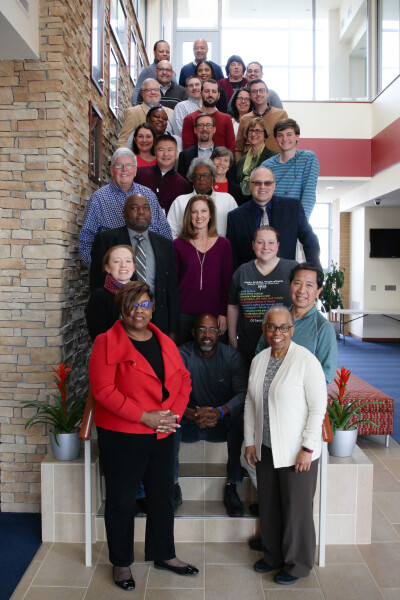Conference addresses pandemic of racism
By Erik Alsgaard
With the Annual Conference Session compacted to one day, members still took significant time in their agenda to address one of the two pandemics facing the United States right now. That is, the pandemic of racism.
“Racism causes us great pain,” said Bishop LaTrelle Easterling. “It causes pain in this conference, throughout our country, and the world.”
The delegation to General and Jurisdictional Conference, elected by conference members in 2019, issued and read a statement to the Annual Conference Session, addressing the issues of racism. The 32-member delegation remains in place through the postponed 2020 General Conference, now scheduled for Aug. 29 through 7, 2021, in Minneapolis, Minnesota.
Chair of the delegation, the Rev. Ianther Mills, senior pastor at Asbury UMC in Washington, D.C., began the reading of the statement, presented to members by video.
“In 2016,” Mills said, “the Northeastern Jurisdictional Conference unanimously approved the Call to Action for Racial Justice in recognition of the deep and lasting problem of racial injustice in our denomination, jurisdictions, and country, and vowed to constructively address it.”
Other members of the delegation continued reading the statement. They noted that the reason for issuing a statement was to provide leadership by giving “voice, witness and action to the insidious acts and existence of racism that continue to infect the society and the church, our nation and the world, and to give impetus to fresh vision and ways of re-imagining a church structure, governance, and way of existing in which all of God’s people are treated fairly and justly, and are fully valued.”
In the statement, the delegation states that in their preparation for the General and Jurisdictional Conferences, they will be working together “to advance the cause of becoming a fully inclusive, anti-racist church.” They also pledge to monitor all legislation coming before the two conferences, looking for how it will “impact and potentially disenfranchise people and communities of color, the poor, and those who are marginalized and have been oppressed in other ways.”
The Annual Conference Session also learned about ways they, too, can commit to being anti-racist. One way is to sign a pledge committing to becoming anti-racist. To date, more than 360 churches and individuals have signed the pledge.
Christie Latona, Direction of Connectional Ministries for the Baltimore-Washington Conference, noted that this action is a continuation of the NEJ Call to Action for Racial Justice.
“We are asking churches to pledge their Commitment to Becoming an Anti-Racist Church,” she said, “by signing the statement. Together, we will seek justice, do the work, and end racism as disciples of Jesus Christ.”
There are also opportunities for people interested in going deeper in their ministry of anti-racism by serving on the Racial Justice Team of the BWC’s Advocacy and Action Network. This team will work with the Conference Committee on Religion and Race (CCORR) to address systemic oppression, acts of hate, and hierarchies of human value. Learn more and sign up.
